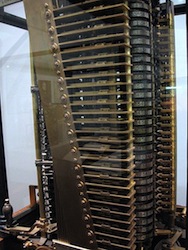Building Babbage’s 19th Century Supercomputer
With SC11 right around the corner – that super show focused on even more super supercomputers and cutting edge HPC technology – it’s fitting to take a moment to remember that all of this is built on the shoulders of yesterday’s computer pioneers.
That’s why a recent piece in the NewYork Times by one of the best technology writers around – John Markoff – is so pertinent.
He reports that the Science Museum in London has tackled the task of building the Babbage Analytical Engine, conceived by the  English mathematician Charles Babbage in 1837, but never built. The room size monster will be powered by metal gears and rudimentary punch cards. It’s the successor to the Babbage difference engine, a mechanical calculator that now exists as a display at the Science Museum.
English mathematician Charles Babbage in 1837, but never built. The room size monster will be powered by metal gears and rudimentary punch cards. It’s the successor to the Babbage difference engine, a mechanical calculator that now exists as a display at the Science Museum.
According to Wikipedia, the Analytical Engine incorporated an arithmetical unit, control flow in the form of conditional branching and loops, and integrated memory, making it the first Turing-complete design for a general-purpose computer. It took another 100 years for the first general purpose computers to be built.
Markoff writes that the challenges of building the machine are “daunting.” He notes that: “In the case of the Difference Engine, a complete set of plans existed. The Analytical Engine, by contrast, was a work in progress, as Babbage continually refined his thinking in a series of blueprints. Thus, the hope is to “crowd-source” the analysis of what should be built; plans will be posted online next year, and the public will be invited to offer suggestions.”
The article describes the part played another major computer pioneer – Augusta Ada King, Countess of Lovelace, daughter of the poet Lord Byron. She is known as the first programmer, creating a program for the machine that only existed in Babbage’s constantly reworked plans. This is fascinating article; don’t miss it.










